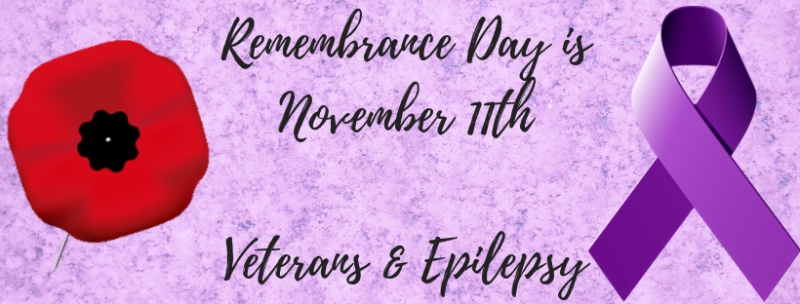Remembrance Day is November 11th – Veterans & Epilepsy

Veterans with epilepsy are an underrepresented demographic of people with epilepsy. In fact, veterans have been shown to have a proportionately higher risk of developing epilepsy than the general public, with nearly half of all veterans with head trauma developing epilepsy within their lifetime. As Remembrance Day is close approaching on November 11th, the BC Epilepsy Society hopes to promote public awareness of the impact of epilepsy on the lives of veterans and to provide support to these veterans with epilepsy to live full, productive and successful lives.
Traumatic Brain Injury (TBI) is the leading and most common form of injury in men and women in the military. TBI occurs when a person’s brain is physically injured, usually by sudden force; with men and women in the military, this usually occurs due to a concussive blast or explosion.
TBI is often undiagnosed or underdiagnosed because the damage by TBI is internal and there may be no visible head wound. Additionally, men and women in the military tend to underreport mild TBI to avoid removal from combat situations/active duty. This is why early diagnosis and treatment are important, as well as a discussion on the risks of TBI and head trauma.
TBI and head trauma increases the chances of developing epilepsy. Half of all wounded veterans with TBI will develop epilepsy in their lifetime. Post-Traumatic Epilepsy (PTE) is a form of epilepsy that is caused by TBI. If you have suffered a TBI and think that you could be experiencing seizures, you are encouraged to see a health care professional for a proper diagnosis.
In the United States, the US Department of Veteran Affairs Epilepsy Centers of Excellence (ECoE) provide epilepsy evaluation and care for veterans with epilepsy. The BC Epilepsy Society urges the same kind of support for epilepsy in the Veteran Affairs Canada health care system and for a national coordination of epilepsy clinical care for veterans.
For information, you can contact the BC Epilepsy Society at 604-875-6704 and info@bcepilepsy.com. You should also visit the Veteran Affairs Canada website to find your local Veteran Affairs Canada office for resources and support.





